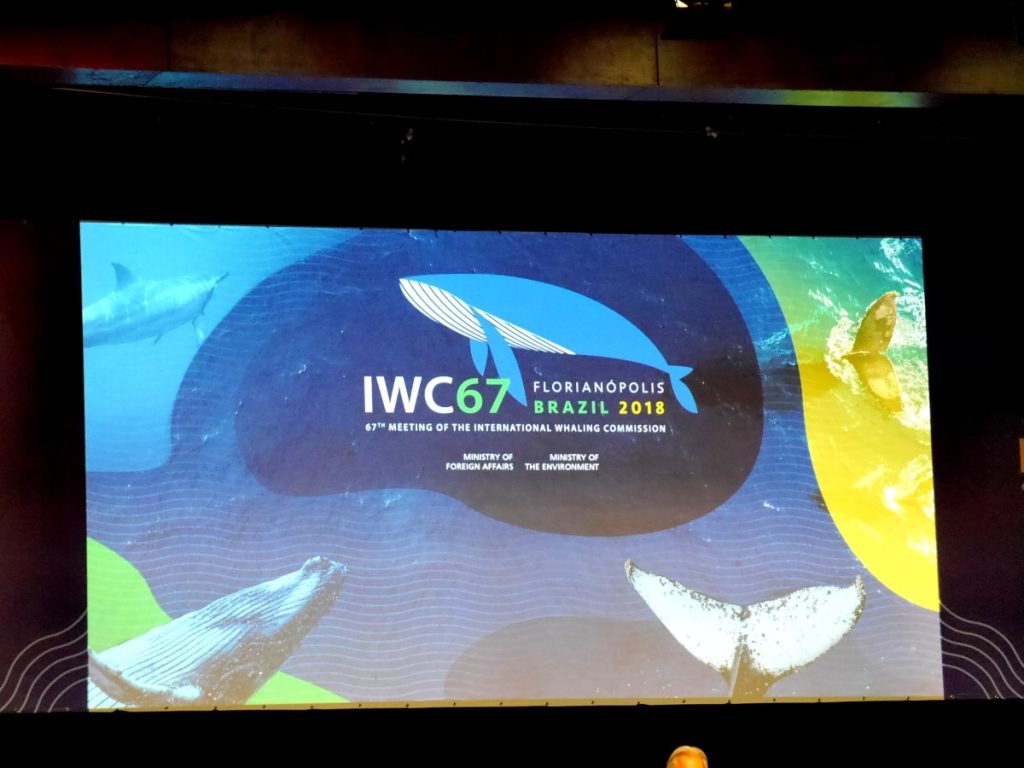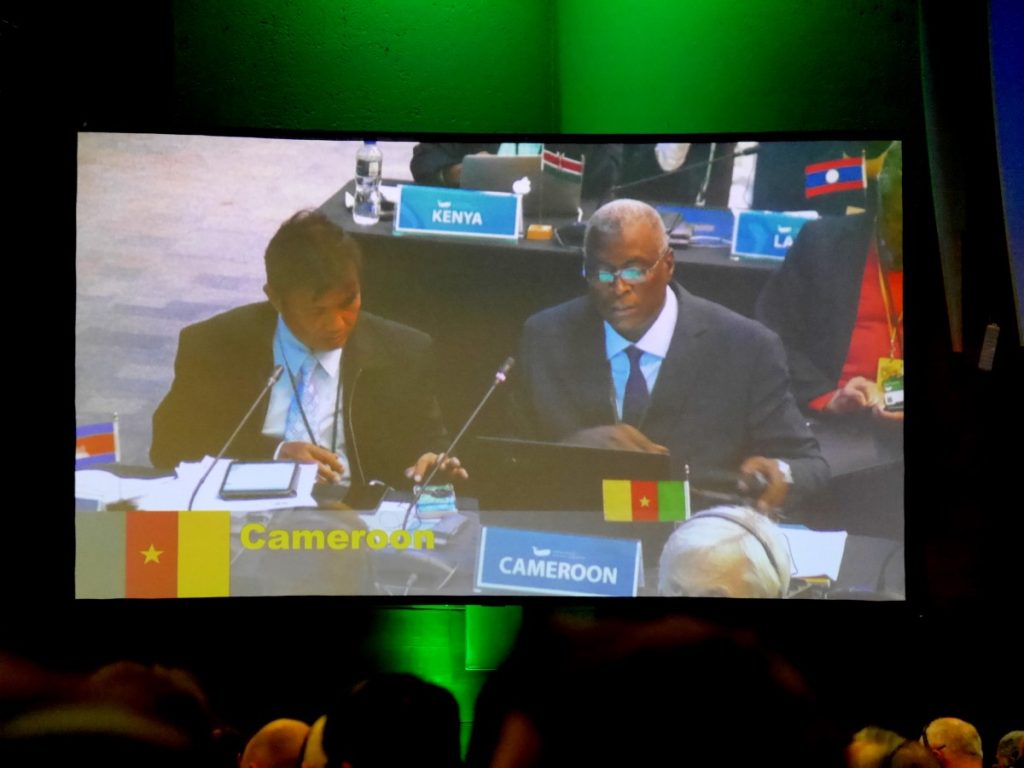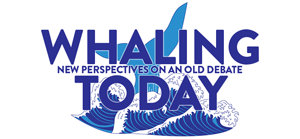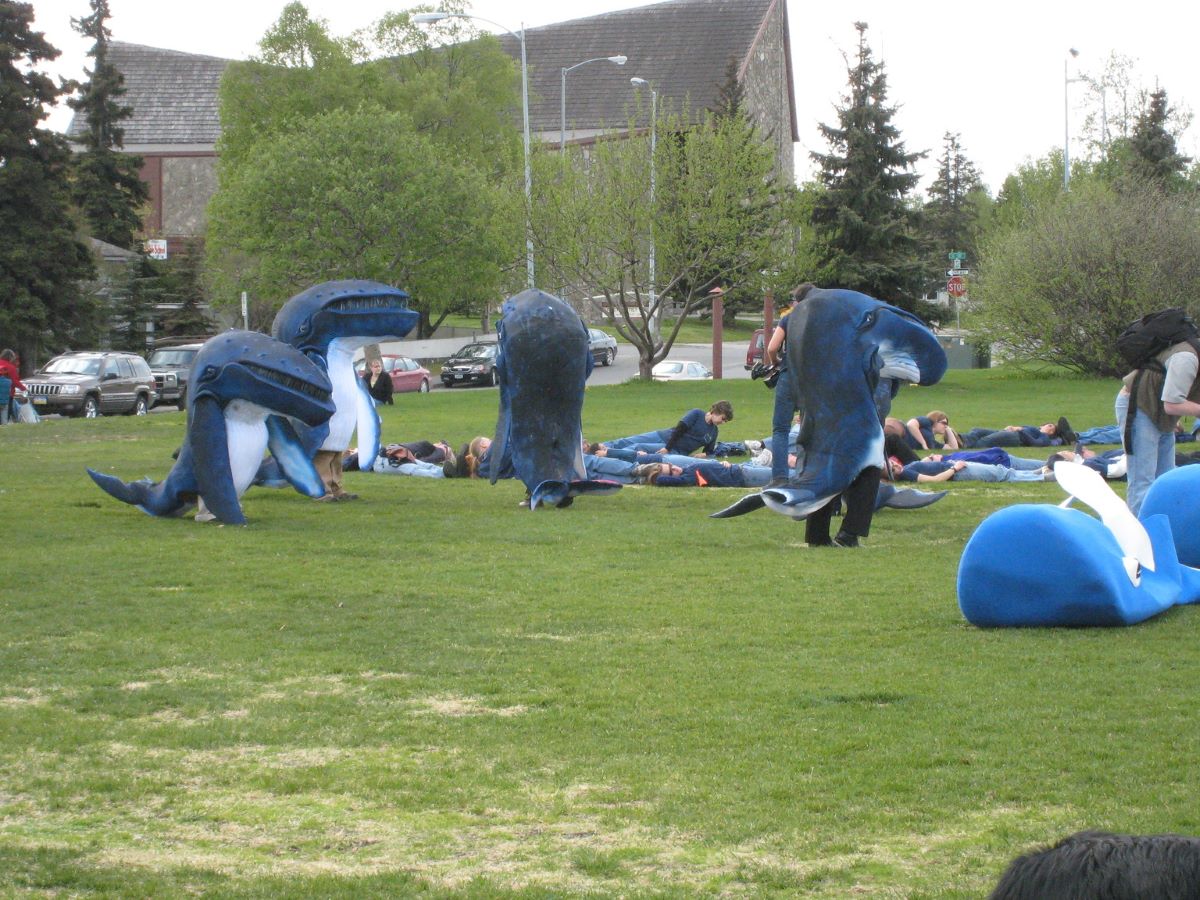In the five years since Japan’s withdrawal from the International Whaling Commission, through the COVID-19 pandemic, and up to IWC69, the Commission has increasingly redefined itself, establishing its character and appearance as a “whale protection” organization. That takes it well beyond the terms and intentions of the 1946 International Convention for the Regulation of Whaling. Is the convention now redundant, and what implications does this have for the commission’s future?
Last of Five parts
First: IWC69 Report: Has the International Whaling Commission become a Zombie?
Second: IWC69 Report: Main IWC Agenda Items of the Session
Third: IWC69 Report: Catch Quotas and Sanctuary
Fourth: IWC69 Report: Nonbinding Resolutions
Commission’s Redefined Purpose
These days, the International Whaling Commission seeks:
- Reduction of whale bycatch by fisheries,
- Implementation of training programs to rescue whales in the event of bycatch,
- Dissemination of information on depleted and rare whale species and the implementation of their protection programs,
- Research and dissemination of information on the negative impacts of climate change on whales,
- Responding to the problem of collisions between whales and ships,
- Research on the effects of marine pollution and other factors on whales, and
- Strengthening cooperation with multilateral environmental protection treaties and organizations (eg CITES, Convention on Biological Diversity (CBD), Convention on the Conservation of Migratory Species of Wild Animals (Bonn Convention, CMS)) and environmental protection groups, etc.
It is no exaggeration to say that the management of whaling activities, which is the essence of the original mission of the ICRW, has been reduced to the renewal of the ASW strike limits every six years. Now a system for automatic extension of the ASW strike limits has been introduced, as long as the status quo is maintained. This has further reduced the priority of managing whaling activities at the IWC.
Would such a shift of the IWC to a whale protection organization have been prevented if Japan had not withdrawn from the IWC? As it turns out, a little more resistance would have been possible. However, the implementation of whale protection activities such as those described above does not require a legally-binding Schedule amendment. Thus, they cannot be blocked by a quarter vote or by a quorum, as was the case with the proposal to establish a South Atlantic Whale Sanctuary.
IWC’s Nonbinding Resolutions
In most cases, it is sufficient to adopt a resolution that is not legally binding and can be adopted by a simple majority. (Those will certainly be adopted in the current situation where the anti-whaling nations have a majority in IWC). No matter how much the countries that support sustainable use, including Japan, oppose them, whale protection activities are now a function of the IWC.
Whale protection activities have been a huge additional burden on the finances of the IWC since their introduction. They were, in fact, among the reasons the IWC found itself in a financial crisis. Nevertheless, one after another, anti-whaling countries created whale protection programs.
This was possible because of the large donations from wealthier anti-whaling countries, especially Australia, and the strong support of anti-whaling non-governmental organizations. The anti-whaling countries transformed the IWC into a whale protection organization through the power of votes and financial resources.
Having participated in recent IWC meetings, including IWC 69, the author cannot help but feel a sense of discomfort. Two groups with completely different world views on whales discuss the various agenda items of the meeting from completely different perspectives. That the two groups are not engaging in real discussion has long been a part of the IWC landscape.

IWC at Odds with Its Convention
In recent years the anti-whaling countries in particular have conducted their discussions without questioning the premise that the IWC is a whale protection organization. It is as if countries that support the sustainable use of whales are outside the consciousness of the IWC. The rejection of the proposal for the establishment of the South Atlantic Whale Sanctuary demonstrated support for the sustainable use approach. Unfortunately, however, the anti-whaling nations do not seem able to bear in mind the perspectives, or even the existence of sustainable use advocates in their deliberations.
The language of the International Convention for the Regulation of Whaling, which governs the IWC’s activities, is illustrative. Its objective is: “to provide for the proper conservation of whale stocks and thus make possible the orderly development of the whaling industry.”
Yet, Australia argued in the whaling case in the International Court of Justice, that the International “Whaling” Commission is nothing more than an international “whale protection” commission from the anti-whaling nations’ point of view. They believe that the world has changed since the Convention was concluded and its intentions no longer matter.
Time to Dismantle?
The absence of the mass media and the poor coverage of IWC69’s decision seems related to the transformation of the International “Whaling” Commission into the International “Whale Protection” Commission. The media tends to give priority to covering controversies, conflicts, incidents, and critical situations. Also, news of interest to a larger audience is given higher priority. In the case of whaling, the heat of apparent conflicts in IWC is greatly reduced. Also, the IWC doesn’t make decisions that have a significant impact on the world.
Given the current world situation, there are far more consequential issues to cover, such as climate change or the invasion of Ukraine. The media’s motivation for following whaling issues is greatly reduced. Realistically, whaling is no longer a threat to whales. Even concerns about the negative effects of climate change and ocean pollution on whales are probably trivial in the larger scheme of global environmental concerns.
However, these are matters of life and death for anti-whaling NGOs, which seek donations and publicity by using the whaling issue. It is no wonder that many NGOs are “withdrawing” from the whaling issue and shifting their activities to IUU (illegal, unreported, and unregulated) fishing, etc.
The significance of the existence of the IWC itself is greatly diminished, except for a small group of people who are passionate about protecting whales. In this sense, the Bridgewater article advocating the dismantling of the IWC is timely.

Facing the Future of the IWC
Through the conflict over whaling and whales, countries advocating for the sustainable use of marine living resources have made their arguments based on scientific evidence and international law. Whales are the symbol of sustainable use and the IWC has been the main battleground. Nevertheless, as the IWC becomes more and more zombie-like and irrelevant to real environmental issues, the world’s interest in the IWC waning. So, how should we face the organization’s future?
Japan should continue to participate in the IWC as an observer. That way, it can strengthen cooperation with other whaling nations such as Norway, as well as supporters of sustainable use. Meanwhile, pro-sustainable use countries at the IWC have argued that anti-whaling countries’ claims are unscientific and contrary to the principle of sustainable use as well as the International Convention for the Regulation of Whaling itself.
However, the forces calling for the protection of whales are a “vocal minority” in the eyes of the world. Their position, religious convictions, or other beliefs, will not change. Therefore, is targeting such an opponent really effective in defending and promoting the principle of sustainable use?
Rather, would it possibly be more effective to reach out and work with the “silent majority, “those who have a limited voice? They would include primary industry workers in developing countries. That would truly promote the sustainable use principle.
Pursuing the SDGs
The 17 Sustainable Development Goals for 2030 (SDGs) are now considered universal goals. Even elementary school children know them. Their slogan is to achieve a sustainable, diverse, and inclusive society where no one is left behind.
It is precisely the inclusion of the silent majority that is the main focus of the SDGs.
Support for the principle of sustainable use should not be confined to the small world of the IWC. Discussions regarding the sustainable use of marine living resources are taking place in a wide range of forums, including those of the United Nations. For example, there are the:
- UN Fish Stock Agreement;
- World Trade Organization, where negotiations on fisheries subsidies are underway;
- Convention on Biological Diversity (CBD) and BBNJ Agreement (The Agreement under the United Nations Convention on the Law of the Sea on the Conservation and Sustainable Use of Marine Biological Diversity of Areas beyond National Jurisdiction);
- CITES (Convention on International Trade in Endangered Species of Wild Fauna and Flora) and other broad fora.
Their discussions and results connect directly to the management and regulation of fisheries by regional agencies and organizations (RFMOs).
In addition, at many international negotiation forums, the progression of Western-led proceedings has become more difficult. Take the recent Conference of the Parties to the United Nations Framework Convention on Climate Change (COP29). Or the Fifth Session of the Intergovernmental Negotiating Committee on Plastic Pollution. They illustrate why the international community must consider the perspectives of previously silent countries.
How to contribute to the sustainable use of marine living resources is extremely challenging in the face of various changes and uncertainties impacting the world. Navigating these will take the know-how and cooperation developed by those involved in the international whaling issue.
RELATED:
This article is published in cooperation with the Institute of Cetacean Research in Japan. Let us hear your thoughts in our comments section.
Author: Joji Morishita, PhD
Former Professor, Tokyo University of Marine Science and Technology
The views and policies expressed in this article are the author’s own and may differ from those of the Japanese government. Any misunderstandings or errors contained herein are the sole responsibility of the author.

